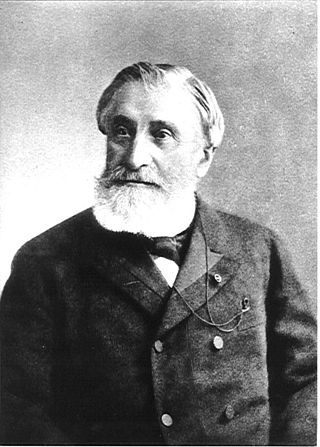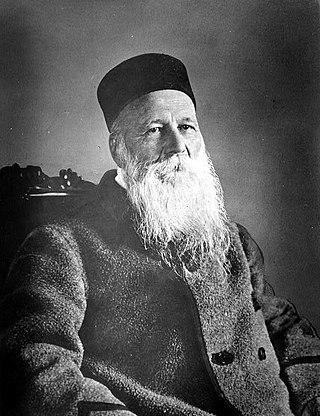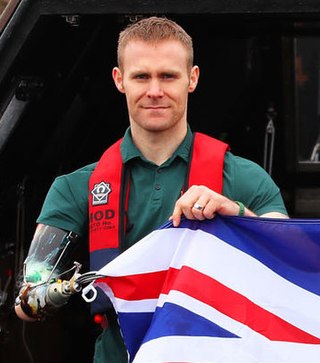
Burhānuddīn Rabbānī was an Afghan politician and teacher who served as President of Afghanistan from 1992 to 1996, and again from November to December 2001.

The organized International Red Cross and Red Crescent Movement is a humanitarian movement with approximately 16 million volunteers, members, and staff worldwide. It was founded to protect human life and health, to ensure respect for all human beings, and to prevent and alleviate human suffering. Within it there are three distinct organisations that are legally independent from each other, but are united within the movement through common basic principles, objectives, symbols, statutes, and governing organisations.

Henry Dunant, also known as Henri Dunant, was a Swiss humanitarian, businessman, social activist and the co-founder of Red Cross movement. His humanitarian efforts won him the first Nobel Peace Prize in 1901.

In medicine, a prosthesis, or a prosthetic implant, is an artificial device that replaces a missing body part, which may be lost through trauma, disease, or a condition present at birth. Prostheses are intended to restore the normal functions of the missing body part. Amputee rehabilitation is primarily coordinated by a physiatrist as part of an inter-disciplinary team consisting of physiatrists, prosthetists, nurses, physical therapists, and occupational therapists. Prostheses can be created by hand or with computer-aided design (CAD), a software interface that helps creators design and analyze the creation with computer-generated 2-D and 3-D graphics as well as analysis and optimization tools.

Gino Strada was an Italian war surgeon, human rights activist, peace activist, and founder of Emergency, a recognized international non-governmental organization.

Raja Mahendra Pratap was an Indian freedom fighter, journalist, writer, revolutionary, President in the Provisional Government of India, which served as the Indian Government-in-exile during World War I from Kabul in 1915, and social reformist of British India. He also formed the Executive Board of India in Japan in 1940 during the Second World War. He formed the original Indian National Army in 1915 in Kabul which was supported by many Nations including Japan. He also took part in the Balkan War in the year 1911 along with his fellow students of Muhammadan Anglo-Oriental College. He is popularly known as "Aryan Peshwa".

Gustave Moynier was a Swiss jurist who was active in many charitable organizations in Geneva.
Pramod Karan Sethi was an Indian orthopaedic surgeon. With Ram Chandra Sharma, he co-invented the "Jaipur foot", an inexpensive and flexible artificial limb, in 1969.

The International Committee of the Red Cross is a humanitarian organization based in Geneva, Switzerland, and is a three-time Nobel Prize Laureate. State parties (signatories) to the Geneva Convention of 1949 and its Additional Protocols of 1977 and 2005 have given the ICRC a mandate to protect victims of international and internal armed conflicts. Such victims include war wounded persons, prisoners, refugees, civilians, and other non-combatants.
Miroslaw (Mirek) Vitali, OBE was a physician specialising in treatment and care of amputees. He was awarded the Order of the British Empire in 1986 in recognition of his outstanding work helping British servicemen who lost limbs in World War II.
New Kabul Bank is a bank in Afghanistan that has its main branch in the capital city of Kabul. It was established in 2004 as the Kabul Bank, the first private bank in Afghanistan. After corruption and scandals it was re-established in 2011 as the New Kabul Bank.

Francis Joseph Ricciardone Jr. is a former President of the American University in Cairo. Ambassador Ricciardone was the United States ambassador to Turkey between 2011 and 2014. Previously he was Deputy Ambassador at the U.S. Embassy in Kabul, Afghanistan. He was also on leave from the U.S. Department of State as a guest scholar at the U.S. Institute of Peace. He has served as U.S. Ambassador to the Arab Republic of Egypt (2005–2008), the Republic of the Philippines and the Republic of Palau (2002–2005). As a career member of the Senior Foreign Service, he received U.S. government and other organization awards for his work in foreign policy and program management, political reporting and analysis, and peacekeeping.

The Henry Dunant Medal is the highest award of the Red Cross Movement. It is named after Henry Dunant, the founder of the Red Cross Movement. The medal is presented every two years by the Standing Commission of the Red Cross and Red Crescent. This body represents the International Committee of the Red Cross, the International Federation of Red Cross and Red Crescent Societies and the various National Red Cross and Red Crescent Societies.

Aziz Ullah Haidari was a Reuter's correspondent and photo-journalist in Pakistan. On 19 November 2001, he, along with three other journalists, were kidnapped and murdered by the Taliban on the highway of Sarobi area situated between Jalalabad and Kabul in Afghanistan.

Giles Duley is an English portrait and documentary photographer, chef, writer, CEO and presenter. Duley also cooks, and writes about food and food politics, under the moniker The One Armed Chef. He is best known for his work documenting the long term impact of war. He is the founder and CEO of the NGO Legacy of War Foundation, and in 2022 was announced as the first United Nations Global Advocate for Persons with Disabilities in Conflict and Peacebuilding Settings.
T43 is a disability sport classification for disability athletics, applying to athletes with "Double below knee amputation or similar disability." It includes ISOD classified athletes from the A4 and A9 classes.
A1 is an amputee sport classification used by the International Sports Organization for the Disabled (ISOD) for people with acquired or congenital amputations. This class is for sportspeople who have both legs amputated above the knee. Their amputations impact their sport performance, including having balance issues, increased energy costs, higher rates of oxygen consumption, and issues with their gait. Sports people in this class are eligible to participate in include athletics, swimming, sitting volleyball, archery, weightlifting, badminton, lawn bowls, sitzball and wheelchair basketball.
On 27 January 2018, an ambulance was used as a vehicle-borne improvised explosive device near Sidarat Square in Kabul, Afghanistan. At least 103 people were killed and 235 others wounded in the attack. The Taliban claimed responsibility for the attack.

Mark Ormrod is a former Royal Marine, Invictus Games athlete, author and motivational speaker. After triggering an improvised explosive device during a routine foot patrol in 2007, he suffered serious injuries resulting in a triple amputation. He was the UK's first triple amputee to survive the Afghanistan conflict. He has since gone on to participate in the Invictus Games.

The 1901 Nobel Peace Prize was the first peace prize resulting from Alfred Nobel's will to recognize in the preceding year those who "have done the most or the best work for fraternity between nations, for the abolition or reduction of standing armies and for the holding and promotion of peace congresses." It was equally divided between the Swiss humanitarian Henri Dunant (1828–1910) "for his humanitarian efforts to help wounded soldiers and create international understanding" and the French pacifist Frédéric Passy (1822–1912) "for his lifelong work for international peace conferences, diplomacy and arbitration." It was the first of the many times the Nobel Peace Prize has been shared between two or more individuals.














